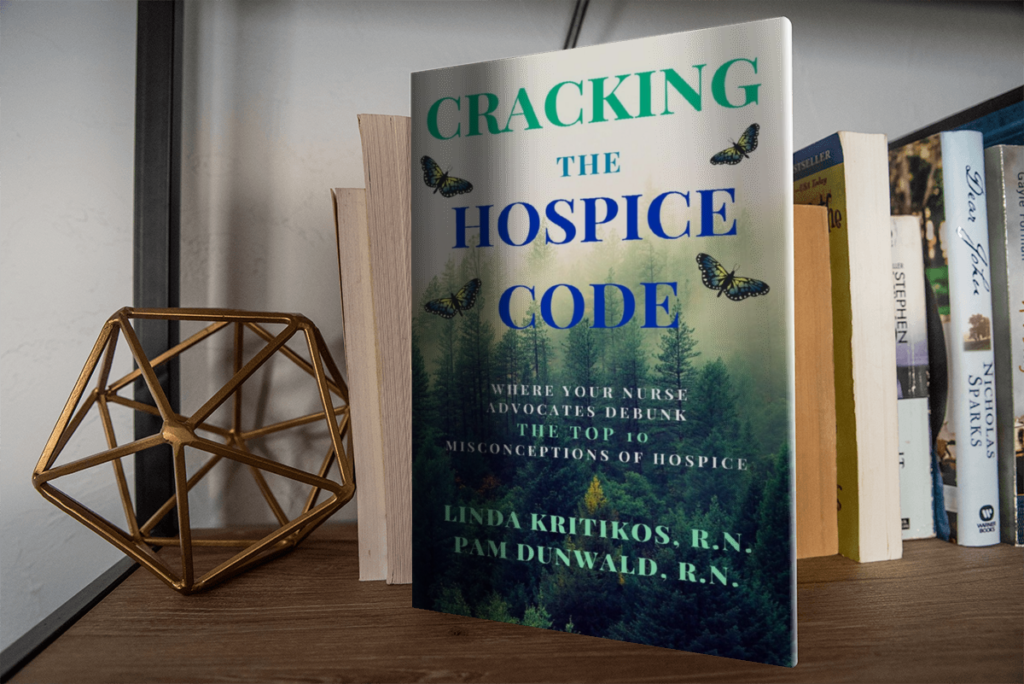Introduction
To help guide you through end-of-life care we have some tips for family caregivers. We have many years of experience between us as well as real life stories we will share to help you gain perspective during one of the most intimate times for your family.
November is hospice month, and we will spend it offering you as much guidance and information as we can to provide you with knowledge and support.
Imagine sitting by your father’s bedside, holding his frail hand. He has always been a strong independent man and he was for sure the driving force in our family. He fought through his cancer and did not want to give up. He was admitted to hospice but then changed his mind a few days later and wanted to go to the hospital. He was not ready to go.
My sister and I sat with him in the hospital all night. His doctor came in late into the evening and apologized to him for missing his kidney cancer. The doctor looked just as defeated as our dad. We could have been angry at this point and we did discuss the alternatives. It would not give our dad back his life so we let it go with grace.
The tumor was the size of a football before they found it and had spread into other organs including his lungs. He still wanted the surgery and had it removed prior to this hospitalization.
He laid in the hospital bed so weak. We had never seen him this way. It was so out of character. He asked for some orange sherbert. It was his favorite. The hospital had some but he was too weak to feed himself. As the oldest and the nurse in the family, I picked up the spoon and the cup of sherbert and began to feed him.
At one point he got so angry and snapped at me and said “Stop feeding me so @#%$** fast!! I stopped looking across the bed at my sister and then we looked at our dad and the 3 of us started laughing. This was the dad we knew our whole life. One last glimpse of the man we will always remember.
The next morning we took him home once again on hospice. He stayed alert until our Pastor came to the house and by noon he was unresponsive and passed later that evening.
This blog post seeks to provide guidance and support to caregivers like our family, offering practical advice and emotional encouragement through the end-of-life phase. This post is an overview of what we will dive deeper into this coming month of November.
Caring for a loved one in their final stages of life is an emotional and challenging experience. It’s a time when family caregivers play a crucial role, offering not only physical care but also emotional support. To illustrate the impact caregivers have, I’d like to share a touching story from our book
Introduction to the Importance of End-of-Life Care and the Role of Caregivers. For more stories and insights on end-of-life care and hospice, consider getting our book, “Cracking the Hospice Code” Your Nurse Advocates Debunk the Top 10 Misconceptions of Hospice.
Cathy led a hard life. A daughter that left too soon by suicide and she was left to raise her grandson. She did not have a good marriage and her husband had passed years before she became ill.
She had C.O.P.D. Chronic Obstructive Pulmonary Disease and now on oxygen full-time. She was a single aging adult with a sister states away and 1 friend to support her. Her grandson lived with her but was often unreliable for assistance.
Cathy was my hospice client for over a year. It took a bit to crack that tough “I don’t give a damn” attitude she had along with her always colorful choice of cuss words. It didn’t matter. We became allies over time and had a great rapport.
There is so much more to this story that we share in our book but too long for a post like this. The bottom line is that we were able to help Cathy take a trip of a lifetime before she passed. She had one other daughter living on the west coast she wanted to see one last time.
Understanding the End-of-Life Care Needed of Aging Adults
Caring for aging adults in their final stages requires sensitivity and understanding. Each individual has unique needs and preferences that should be respected and honored. It is crucial to engage in open conversations to understand their wishes and ensure their comfort and dignity are prioritized. This stage of life often involves managing pain, ensuring emotional support, and respecting end-of-life decisions, such as hospice or palliative care.
Aging adults in their final stages have unique needs, both physical and emotional. It’s essential to understand these needs to provide compassionate and effective care. This includes managing pain, ensuring comfort, and respecting their wishes. Listening becomes a powerful tool—listening to their stories, fears, and hopes. Learning about how the body naturally prepares for death.
Food and drink are a big concern for families of loved ones on that final journey. It is common sense to most of us that one must continue to eat and drink or life will end. Not the case with a body preparing to pass.
We naturally begin a process of “dehydrating”. Following a period of thirst our body begins to shut down. Muscles begin to lose their strength. Swallowing becomes more difficult and avoiding food and drink becomes part of the process. Forcing a loved one to eat or drink at this point may even result in choking because the swallowing muscles are not working to full capacity. We realize this may be a hard pill to swallow so to speak but it is a natural part of the process
2 Types of care can be considered when there is no hope for a cure as with a chronic illness such as cancer, heart failure, COPD, or Alzheimer’s Disease. See the diagram below for the differences in each program.
Understanding the Stages of Grief: A Guide for Caregivers
Caring for a loved one at the end of life can be an emotionally complex journey. As caregivers, it’s important to recognize that both you and your loved one may experience the stages of grief, each manifesting uniquely. Here’s a brief overview of the five stages of grief, along with practical tips to support your aging loved ones through this process with empathy and patience.
The Five Stages of Grief
- Denial: This initial stage often acts as a buffer against the immediate shock of loss. A loved one might struggle to accept the reality of their condition. As a caregiver, offer gentle reassurance and allow them time to process their emotions without pressure.
- Anger: Anger can arise as individuals confront the unfairness of their situation. Encourage open communication and validate their feelings, reminding yourself and them that anger is a natural response.
- Bargaining: Here, individuals might dwell on “what if” scenarios or seek ways to regain control. Support them by listening empathetically and discussing realistic goals or wishes that can be fulfilled.
- Depression: A profound sadness may set in as the reality of the situation becomes unavoidable. Provide comfort by being present, offering a compassionate ear, and encouraging small activities that bring joy or peace.
- Acceptance: In this stage, individuals come to terms with their situation. Facilitate an environment where they feel dignified and valued, respecting their wishes and decisions.
Tips for Caregivers
- Empathy and Active Listening: Truly listening to your loved one’s fears and concerns can provide immense comfort. Acknowledge their feelings without judgment.
- Open Communication: Encourage honest discussions about emotions, memories, and any fears related to their journey. This can alleviate anxiety and strengthen your bond.
- Patience: Each stage of grief unfolds at its own pace. Allow your loved one to experience these emotions naturally without rushing the process.
- Create Comfort: Ensure that your loved one’s physical environment is peaceful and comforting, filled with personal touches that make them feel secure and cherished.
- Self-Care: Remember to care for yourself. Engage in activities that replenish your energy and seek support from friends, family, or professionals when needed.
- Seek our the assistance of a patient or nurse advocate to educate you on your options and assist you in making an informed decision on what is the next steps for you and your loved one.
Resources for More Information and Support for End-of-Life Care
- Books: “On Grief and Grieving” by Elisabeth Kübler-Ross and David Kessler provides insights into the grieving process and practical advice for navigating it.
- Websites: The Alzheimer’s Association offers resources and support for caregivers dealing with grief.
- Support Groups: Joining a local or online support group can connect you with others who understand your experience and provide mutual support. Seek out the Aging or Senior County Government agency for local resources in your area. If you are unsure what that is, reach out to your local health department and they can get you the details on this resource.
In the midst of caregiving, remember that understanding grief is a journey for both you and your loved one. By fostering an environment of empathy, open communication, and patience, you can navigate this path together with compassion and dignity.
Creating a Comfortable and Supportive Environment
A home that fosters comfort and support can significantly impact a loved one’s quality of life. Simple changes, like rearranging furniture for easier mobility or adding personal touches, can make a difference. Consider incorporating soothing music, soft lighting, and cherished mementos to create a calming atmosphere. These changes not only benefit the individual but also provide a sense of normalcy and comfort for caregivers.
Creating a warm and supportive home environment involves more than just physical adjustments. It’s about fostering a space where your loved one feels safe and cherished. Consider these tips:
- Personalize Their Space: Surround them with familiar items, photos, and mementos.
- Ensure Comfort: Invest in supportive bedding and adaptive furniture to meet their physical needs. A hospice agency can supply equipment, a hospital bed, medications, etc. all covered under the Medicare hospice benefit.
- Promote Calmness: Use soothing colors and soft lighting to create a peaceful atmosphere.
Navigating the Healthcare System Regarding End-of-Life Care
Understanding the healthcare system can be daunting, but it’s essential for accessing appropriate care options. Familiarize yourself with terms like hospice and palliative care to better advocate for your loved one’s needs. Utilize resources such as social workers, patient advocates, and healthcare professionals to guide you through this process. Their expertise can help demystify complex medical jargon and procedures, making it easier to make informed decisions.
Understanding the healthcare system and the variety of care options can be overwhelming. From hospice to palliative care, each option has its benefits. Here’s how you can begin:
- Educate Yourself: Learn about the different types of care available and what each entails.
- Ask Questions: Engage with healthcare professionals to clarify any doubts.
- Advocate for Your Loved One: Ensure their wishes are respected and their care is personalized.
Self-Care for Family Caregivers
While caring for others, it is imperative that caregivers also take care of themselves. Burnout and stress are common among caregivers, which can impact their ability to provide care. Prioritizing physical and mental well-being through activities like exercise, meditation, or pursuing hobbies can rejuvenate caregivers and enhance their caregiving capacity. Sharing first-hand experiences from caregivers who have benefited from self-care practices reinforces the importance of maintaining balance.
Caring for others begins with caring for yourself. Neglecting your own well-being can lead to burnout, affecting your ability to provide the best care. Hear from Jane, a caregiver who prioritized self-care and found it transformed her caregiving experience:
“Taking time for myself felt selfish at first, but I soon realized it gave me the strength to support my mom with love and patience.”
Building a Support Network
No caregiver should feel alone in their journey. Building a strong support network can provide emotional relief and practical assistance. Reach out to family, friends, or caregiver support groups to share experiences and gain insights. Accessing professional help, such as counseling or therapy, can also offer valuable coping mechanisms and emotional support. Quotes from caregivers who have successfully navigated these networks can instill hope and motivation.
You are not alone in this journey. Building a support network can provide much-needed relief and guidance. Consider joining support groups or seeking professional counseling. Connect with others through:
- Support Groups: Share experiences and gain insights from others in similar situations.
- Professional Help: Don’t hesitate to ask for assistance from social workers or therapists.
- Community Resources: Tap into local organizations offering caregiver support.

Conclusion
Providing end-of-life care for a loved one during their final journey is a profound responsibility that requires patience, empathy, and resilience. Remember that you are not alone—support is available, and guidance is accessible.
For those seeking deeper insights and answers to their questions about hospice care, consider exploring our book. It offers comprehensive information to aid caregivers in their challenging yet rewarding journeys. Together, we can ensure that our loved ones receive the compassion and dignity they deserve during their final days.
Navigating end-of-life care is a path filled with challenges and deep emotions, but it’s also an opportunity to express love and gratitude. It can be recognized as a privilege to help care for someone at the end of their life. Remember, you’re not in this alone. With understanding, support, and resources, you can guide your loved one through this final chapter with grace.
Thank you for joining us on this important topic. We hope this guide helps you find strength and support in your caregiving role.
Take care and we will see you back here soon,
Pam and Linda
Your Nurse Advocates
“Compassionate care for aging adults with peace of mind for the adult children.”
Resources:
Free Checklist “How Do I Know if We are Ready for Hospice?”
https://www.nia.nih.gov/health/end-life/different-care-settings-end-life
https://www.nia.nih.gov/health/end-life/providing-care-and-comfort-end-life
https://www.nia.nih.gov/health/end-life/making-decisions-someone-end-life





